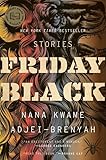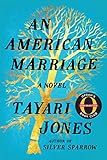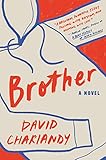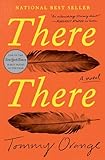The Aspen Words Literary Prize announced its 5-title shortlist, whittled down from the 16-title longlist from late last year. In its second year, the prize aims to award $35,000 to a single work of fiction “that illuminates a vital contemporary issue and demonstrates the transformative power of literature on thought and culture.”
This year’s finalists (complete with bonus links and Publishers Weekly reviews) are as follows:
 Friday Black by Nana Kwame Adjei-Brenyah
Friday Black by Nana Kwame Adjei-Brenyah
Read our interview with Adjei-Brenyah and PW‘s starred review:
Adjei-Brenyah dissects the dehumanizing effects of capitalism and racism in this debut collection of stingingly satirical stories. The arguments that exonerate a white man for brutally murdering five black children with a chainsaw in “The Finkelstein 5” highlight the absurdity of America’s broken criminal justice system. “Zimmer Land” imagines a future entertainment park where players enter an augmented reality to hunt terrorists or shoot intruders played by minority actors. The title story is one of several set in a department store where the store’s best salesman learns to translate the incomprehensible grunts of vicious, insatiable Black Friday shoppers. He returns in “How to Sell a Jacket as Told by IceKing” to be passed over for a promotion despite his impeccable record. Some stories take a narrower focus, such as “The Lion & the Spider,” in which a high school senior has to take a demanding job to keep money flowing into his family’s house after his father’s disappearance. In “Light Spitter,” a school shooting results in both the victim and gunman stuck in a shared purgatory. “Through the Flash” spins a dystopian Groundhog Day in which victims of an unexplained weapon relive a single day and resort to extreme violence to cope. Adjei-Brenyah has put readers on notice: his remarkable range, ingenious premises, and unflagging, momentous voice make this a first-rate collection.
 Gun Love by Jennifer Clement
Gun Love by Jennifer Clement
Read PW‘s review:
In her excellent fifth novel, Clement (Prayers for the Stolen) tackles homelessness, America’s love affair with guns, and the economic despair of folks living on the dark edge of society. Pearl is a 14-year-old girl living with her mother in an old car next to a crummy trailer park and the town dump in central Florida. The car has been their home since Pearl was born. She and her mother are dreamers (“It doesn’t take too long to figure out that dreams are better than life,” says her mother), but their dreams don’t spare them from tragedy when cop-killing charmer Eli shows up and woos Pearl’s mother, coming between mother and daughter. Eli and trailer neighbors Pastor Rex and Ray are in the gun-running business, selling weapons in Texas and Mexico. When Pearl’s small, insular world is shattered by an armed drifter, she starts on a dangerous path that will change the rest of her life. Clement’s affecting and memorable novel is also an incisive social commentary that will give readers much to ponder.
 An American Marriage by Tayari Jones
An American Marriage by Tayari Jones
Read Jones’s 2017 Year in Reading and PW‘s review:
Jones (Silver Sparrow) lays bare the devastating effects of wrongful imprisonment in this piercing tale of an unspooling marriage. Roy, an ambitious corporate executive, and Celestial, a talented artist and the daughter of a self-made millionaire, struggle to maintain their fledgling union when Roy is sentenced to 12 years in prison on a rape charge he is adamant is false. Before Roy’s arrest, the narrative toggles between his and Celestial’s perspectives; it takes an epistolary form during his imprisonment that affectingly depicts their heartbreaking descent into anger, confusion, and loneliness. When Roy is proven innocent and released seven years early, another narrator is introduced: Andre, Celestial’s lifelong best friend who has become very close to her while Roy has been away. Jones maintains a brisk pace that injects real suspense into the principal characters’ choices around fidelity, which are all fraught with guilt and suspicion, admirably refraining from tipping her hand toward one character’s perspective. The dialogue—especially the letters between Roy and Celestial—are sometimes too heavily weighted by exposition, and the language slides toward melodrama. But the central conflict is masterfully executed: Jones uses her love triangle to explore simmering class tensions and reverberating racial injustice in the contemporary South, while also delivering a satisfying romantic drama.
 Brother by David Chariandy
Brother by David Chariandy
Read Claire Cameron’s 2017 Year in Reading and PW‘s starred review:
Chariandy’s powerful and incendiary second novel (following Soucouyant) probes the ramifications of police violence on marginalized communities and delivers a nuanced portrait of a family struggling to stay afloat as circumstances stack against them. Set during the summer of 1991 in the Park, a suburban Toronto housing complex, the narrative tracks the coming of age of two mixed-heritage brothers as they cling to and ultimately test the patience of their hardworking Trinidadian single mother, “one of those black mothers unwilling to either seek or accept help from others.” During the boys’ teen years, sensitive Michael fumbles through his first real relationship with Aisha, a girl from the block and “the sort of girl the world considers ‘an example’ or ‘the exception,’ ” while his streetwise and volatile older brother, Francis, becomes obsessed with the city’s burgeoning hip-hop scene. Unfortunately, Francis’s passion for music doesn’t quell his problem with authority, and a run-in with the police at a local hangout turns violent, with devastating consequences. Told from Michael’s perspective, the novel presents a grim reality—gang shootings, entrenched racism and fear, lack of opportunity, and loss. But instead of relying on stale stereotypes, Chariandy imbues his resilient characters and their stories with strength, dignity, and hope. This is an impressive novel written by an author in total command of his story.
 There There by Tommy Orange
There There by Tommy Orange
Read our June Book Preview) and PW‘s starred review:
Orange’s commanding debut chronicles contemporary Native Americans in Oakland, as their lives collide in the days leading up to the city’s inaugural Big Oakland Powwow. Bouncing between voices and points of view, Orange introduces 12 characters, their plotlines hinging on things like 3-D–printed handguns and VR-controlled drones. Tony Loneman and Octavio Gomez see the powwow as an opportunity to pay off drug debts via a brazen robbery. Others, like Edwin Black and Orvil Red Feather, view the gathering as a way to connect with ancestry and, in Edwin’s case, to meet his father for the first time. Blue, who was given up for adoption, travels to Oklahoma in an attempt to learn about her family, only to return to Oakland as the powwow’s coordinator. Orvil’s grandmother, Jacquie, who abandoned her family years earlier, reappears in the city with powwow emcee Harvey, whom she briefly dated when the duo lived on Alcatraz Island as adolescents. Time and again, the city is a magnet for these individuals. The propulsion of both the overall narrative and its players are breathtaking as Orange unpacks how decisions of the past mold the present, resulting in a haunting and gripping story.
The post Aspen Words Literary Prize Reveals 2019 Shortlist appeared first on The Millions.
from The Millions https://ift.tt/2IA02OS
Comments
Post a Comment